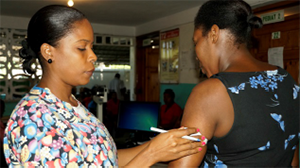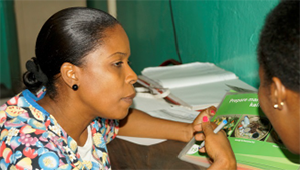
Patricia Chéry is a nurse in the prenatal unit at Hôpital Maternité de Carrefour in West Department, Haiti. Miss Chéry, as with many healthcare workers in Haiti, has received training from outside programs throughout her career. Recently, Miss Chéry participated in the nutrition assessment, counseling, and support (NACS) training provided by the Strengthening Partnerships, Results, and Innovations in Nutrition Globally (SPRING) project, with funding from the United States Agency for International Development (USAID), at her hospital. The training employed an on-the-job training (OJT) methodology—an innovative training approach that involves numerous sessions conducted on-site over the course of 2-3 months. The OJT approach, which can focus on any number of healthcare skills, brings the training to real-world practice.
Miss Chéry chose to participate in the training for a variety of reasons. She wanted to refocus her skills on nutrition services, and the OJT approach made the decision easier. Without disrupting her time on the job or requiring her to travel to an off-site training location, the OJT allowed Miss Chéry to practice new skills she was learning. She was also able to meet different health workers from her hospital and learn from their unique experiences.

Since participating, Miss Chéry has seen a difference in the way she treats her clients. She has a renewed understanding for the importance of nutritional assessment, and she uses counseling cards provided at the OJT to effectively communicate with her clients. Miss Chéry is more confident in counseling her clients to exclusively breastfeed, for example, and has noticed a change in her nutrition service delivery. “Now I pay more attention to the clients’ anthropometric measurements. I put more emphasis on counseling and educating the clients on ways that can help them change their behavior... I feel more mature in my job and act with more confidence, vis-à-vis, my tasks and responsibilities.”
Miss Chéry has also seen a change in her own behavior and attitude towards food and nutrition as an outcome of the NACS training. “Before this training I used to eat a lot of junk food. I have become more conscious of what to eat and how to eat. I pay attention to quality food and have cut down on grease. I have not yet succeeded completely but every day I am making more effort to eat more nutritious food.”
Miss Chéry is enthusiastic about the skills she learned from the NACS training, and has fully embraced the OJT approach. “(There is an) advantage of learning while on the job and the ability to practice while on the job… and while you are practicing you are giving better care to the clients.”